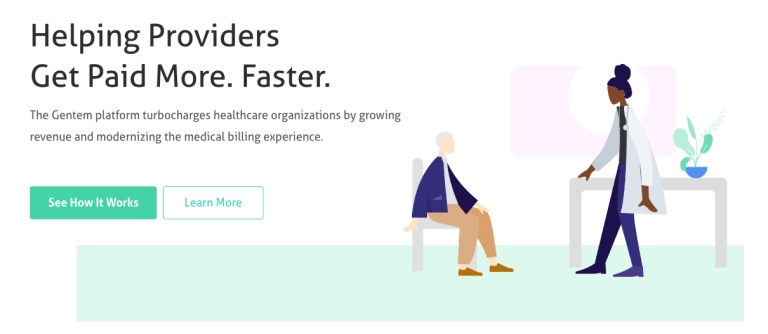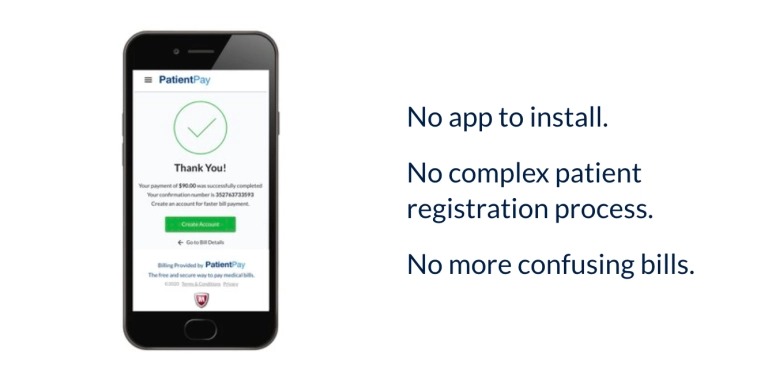Picture this: high stacks of forms, cryptic codes recalling hieroglyphics, and the constant, nagging dread of denial notices. Welcome to the world of medical billing, a bureaucratic labyrinth where sanity goes to bleed out on dusty clipboards. For healthcare providers, this paperwork wastes precious time and resources, hindering their ability to care for patients and dragging productivity down with the weight of unpaid bills.
But don't worry, as a digital savior lurks on the horizon: Artificial Intelligence. These benevolent robots are armed with algorithms and ready to streamline your billing woes and exorcize the demons of reimbursement purgatory.
Dive into this article and you'll be armed with the knowledge to:
- Unravel the tangled web of AI in medical billing: We'll dissect the tech, demystifying medical billing automation for tasks and errors and how it helps to get more out of every claim.
- Witness the bots in action: Learn how AI-powered medical billing software streamlines workflows, reduces errors, and boosts revenue.
- Navigate the human factor: We'll explore the optimal balance between AI and human expertise.
- Meet your AI guide: Discover how Binariks experts can guide your practice through the AI wilderness to streamline billing and achieve financial prosperity.
So, let's delve into the fascinating world of medical billing AI. Prepare to have your perceptions of this bureaucratic beast shattered and your financial anxieties soothed by the promise of a smoother, smarter future.
AWS-based Primary Care Platform
We helped scale a web platform for patient monitoring and management
The impact of AI on medical billing & healthcare finance
For decades, healthcare finance has been grappling with the problem of inefficient billing. Errors lurk in labyrinthine paperwork, denials drain revenue, and the sheer workload transforms administrative staff into paper-pushing zombies. But now, the solution is clear: AI in healthcare billing.
AI is gaining prominence in healthcare as a crucial bridge between patients and providers. The demand for efficient AI-based healthcare solutions is driving significant investments in the industry. Here are key statistics and trends to grasp the current state of AI in healthcare in 2023.
In 2023, the global AI in the healthcare market was valued at approximately USD 22.45 billion, with a projected compound annual growth rate (CAGR) of 36.4% from 2024 to 2030. Key drivers include:
- the expansion of patient health-related digital datasets;
- rising demand for personalized medicine;
- the increasing need to minimize healthcare costs.
What about billing? According to Kevin A. Schulman from Duke Clinical Research Institute, healthcare providers allocate approximately 25% to 31% of their budget to administrative costs, with medical billing and coding constituting around two-thirds of these expenses (Source ).
Tranquilmoney study shows that billing mistakes cost U.S. physicians a staggering $125 billion annually, serving as a reminder that providing optimal patient care is only one of the significant factors in becoming successful in the industry.
In addition, coding errors expose physicians to fines and penalties from regulatory bodies in the United States. (Source ). So, AI for medical billing is precisely what can solve these problems. For sure, AI doesn't just sprinkle pixie dust on this bureaucratic nightmare.
Here's how it works:
AI automation in claims processing
Imagine claims zip through the system like sonic notes, pre-populated, error-free, and ready for reimbursement. AI makes this a reality by automating repetitive tasks like data entry, code assignment, and eligibility verification. This frees up your staff to focus on complex cases and strategic initiatives while reducing errors that can derail claims and drain revenue.
Detection of fraudulent claims
Medical billing is susceptible to fraud, but AI is the ultimate digital detective. Sophisticated algorithms can detect suspicious patterns, inconsistencies, and red flags, preventing fraudulent claims from draining your coffers. This protects your finances and safeguards the integrity of the healthcare system.
Reduction in billing errors
Errors in medical billing are like rogue notes in a symphony, disrupting the flow and causing financial dissonance. AI allows meticulously scouring claims for inconsistencies, missing codes, and duplicate entries. This not only improves accuracy but also reduces the risk of denials and ensures you receive the reimbursements you deserve.
Enhanced revenue recovery
Advanced analytics can identify trends in denials, pinpoint the root causes, and suggest strategies to fight back. This proactive approach helps you recover lost revenue and ensure you're compensated fairly for your services.
Predictive insights
AI offers a high-tech glimpse into the future of your billing. AI can predict claim outcomes, identify potential challenges, and suggest preventive measures by analyzing historical data and current trends. This proactive approach helps you navigate the ever-changing medical billing landscape and optimize your operations for maximum efficiency and revenue.
These are just a few ways AI optimizes billing processes and transforms healthcare finance. In the next block, we'll explore the powerful tools that bring these magic tricks to life.
Take your software to new heights with AI/ML solutions
AI medical billing software
AI medical billing software is booming, bringing multiple intelligent tools to transform your practice's financial health. Let's dive into some real-world examples.
Gentem
This data-driven solution automates claim submission, scrubbing them for errors with eagle-eyed accuracy. Its algorithms analyze denial patterns, suggesting proactive strategies to combat them like a seasoned financial warrior.
Gentem also boasts a human touch, with dedicated RCM experts to ensure seamless integration and ongoing support.

CureMD
This self-driven AI medical billing system transmutes mountains of paperwork into streamlined workflows. Its Autonomous Billing feature automates tasks like pre-authorizations and data entry, freeing staff to focus on patient care.
CureMD uses AI in healthcare claims processing and detects fraudulent claims with uncanny accuracy, protecting your revenue from phantom thieves.

PatientPay
Need help collecting patient payments? PatientPay transforms into your AI-powered collection concierge. It utilizes data analytics to predict payment behaviors and personalize collection strategies for each patient. Think of it as a financial whisperer, gently nudging patients towards timely payments and optimizing your cash flow.

The human factor in medical billing
While artificial intelligence in medical billing is a real revolution, it's crucial to remember that these digital wizards can't perform all the tricks. There are still essential components where the human touch reigns supreme. Here are five areas where AI cannot replace human expertise:
- The empathy quotient: AI excels at crunching numbers and analyzing data but lacks the emotional intelligence crucial for interacting with patients. Understanding their anxieties, navigating billing concerns with sensitivity, and fostering trust cannot be replicated by algorithms. Human billing specialists are critical in establishing patient relationships and ensuring a positive billing experience.
- Ethical decision-making: AI algorithms are only as good as the data they're trained on. This can lead to biases and ethical dilemmas, requiring human intervention to ensure fair and equitable billing practices. Balancing medical necessity with financial considerations, upholding patient privacy, and ensuring ethical coding practices are the areas where human judgment and ethical awareness are critical.
- Creative problem-solving: While AI can automate routine tasks and analyze large datasets, it can't handle the unexpected. Complex billing issues, system glitches, and unforeseen challenges require human creativity and critical thinking to find solutions. The ability to adapt, improvise, and think outside the box remains a uniquely human strength in navigating the intricacies of medical billing.
- Building relationships with stakeholders: Billing isn't just about processing claims; it's about relationships with patients, doctors, insurance companies, and other stakeholders. Negotiating payment plans, advocating for patients' needs, and maintaining positive communication requires the interpersonal skills and cultural awareness that AI lacks. Human expertise is essential for navigating the complex interpersonal dynamics within the healthcare system.
- Strategic vision and leadership: AI can optimize workflows and identify trends, but it can't set long-term vision or make strategic decisions for the future of your practice. Human leadership is crucial for defining financial goals, allocating resources effectively, and adapting to evolving healthcare regulations. The human factor remains the driving force behind steering your practice toward financial stability and growth in the age of AI.
While AI is a powerful tool for streamlining medical billing, it's important to remember that it's not a panacea. The human touch remains essential for providing an empathetic patient experience, making ethical decisions, solving complex problems, building relationships, and leading your practice into a successful future.
Embrace the magic of artificial intelligence for medical billing, but keep the human flame burning bright for a thriving and well-rounded operation.
Binariks will help with AI adoption
Navigating the AI challenges in medical billing might seem tough, but at Binariks, we have the expertise to help you.
We will suggest the right AI tools and devise a plan that fits your needs. Plus, we'll stay by your side to offer ongoing support, ensuring you get the hang of efficient medical billing and can boost your revenue.
So don't worry about tackling the AI Everest – take that first step. Contact Binariks now, and let us guide you to a future of streamlined and profitable medical billing, with a fantastic financial view waiting for you at the top.
Final thoughts
The future of medical billing and artificial intelligence looks promising, especially if guided by qualified experts. With its automated workflows, error-slaying algorithms, and revenue-boosting insights, AI is transforming how healthcare practices operate , paving the way for a future of financial stability and streamlined efficiency.
However, while algorithms excel at automation and analysis, the human touch – empathy, ethical judgment, and strategic vision – remains crucial and firmly in the hands of skilled billing professionals. So, embrace the potential of AI, equip your practice with the right tools, and collaborate with trusted tech partners like Binariks.
Remember, the future belongs to those who embrace innovation while safeguarding the human essence of healthcare. Take a bold step into the AI revolution, and let technology work its magic, empowering your business to achieve its full potential.
Share

